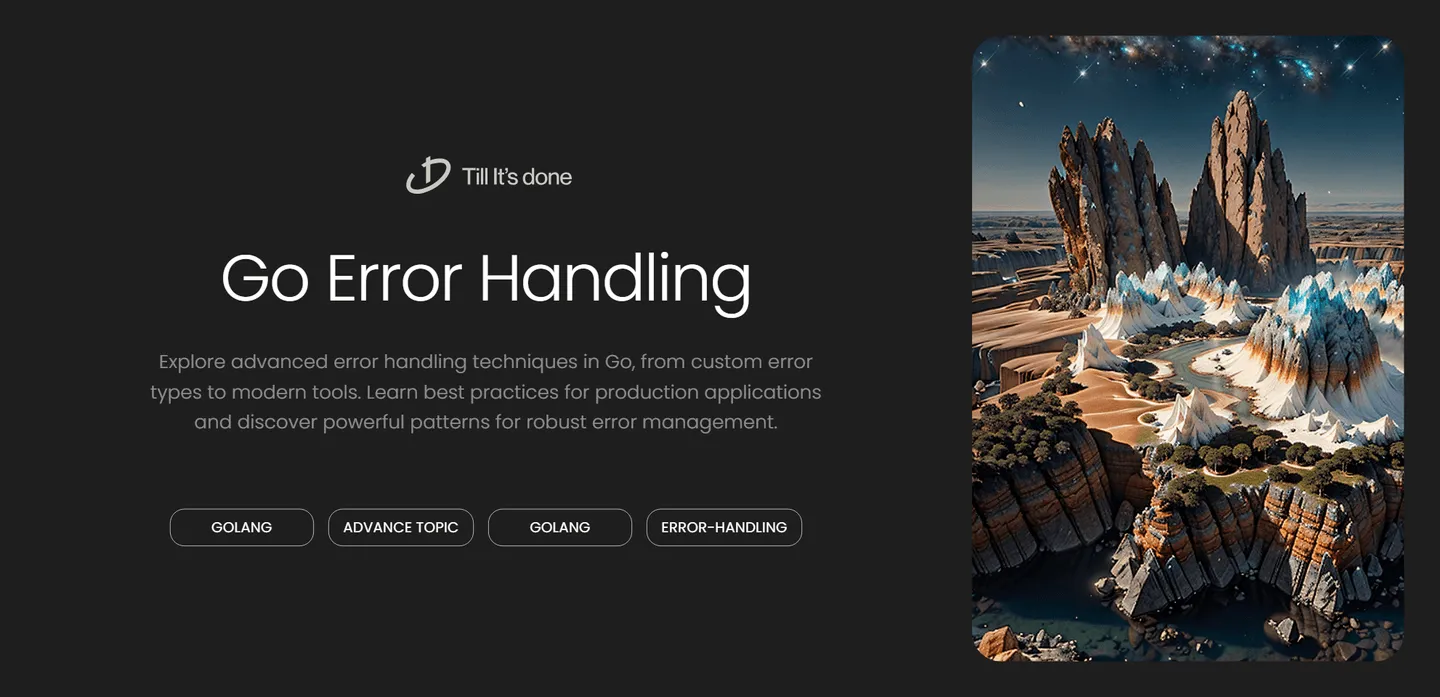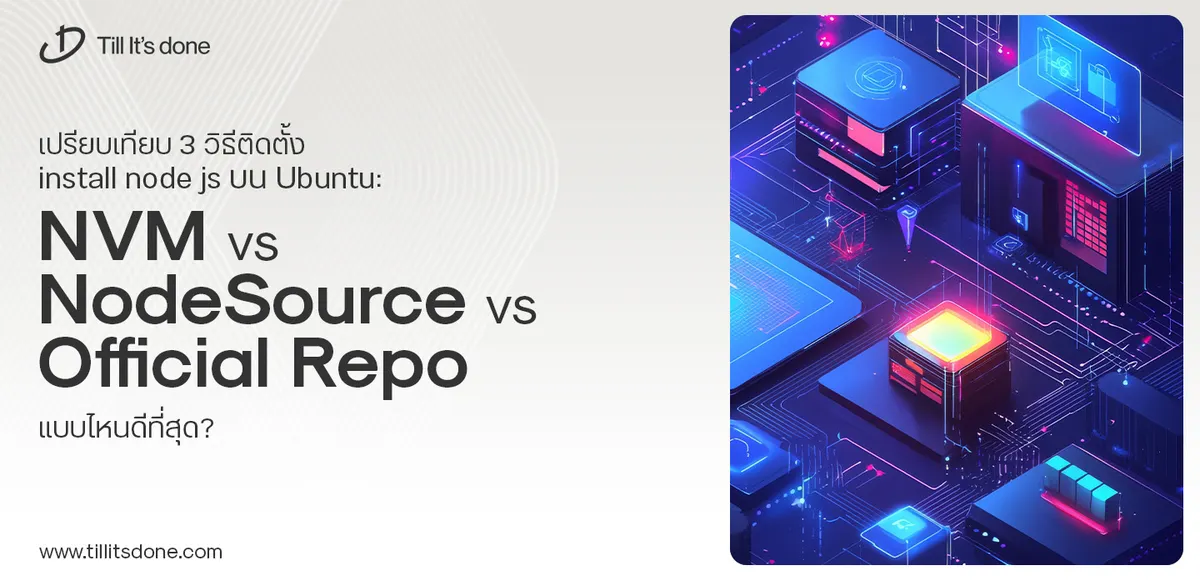- Services
- Case Studies
- Technologies
- NextJs development
- Flutter development
- NodeJs development
- ReactJs development
- About
- Contact
- Tools
- Blogs
- FAQ
Advanced Error Handling in Go: Techniques & Tools
Learn best practices for production applications and discover powerful patterns for robust error management.

Advanced Error Handling in Go: Techniques and Tools

Error handling is one of Go’s most distinctive features, setting it apart from many other programming languages. While the basic if err != nil pattern is well-known, there’s much more to explore in Go’s error handling ecosystem. Let’s dive deep into advanced techniques and tools that can help you manage errors more effectively in your Go applications.
Understanding Error Types in Go
Before we jump into advanced techniques, it’s crucial to understand that in Go, errors are values that implement the error interface. This simple yet powerful approach allows for great flexibility in how we handle errors.
type error interface { Error() string}Custom Error Types
Creating custom error types is one of the most powerful ways to handle errors in Go. They allow you to embed additional context and create more sophisticated error handling flows.
type ValidationError struct { Field string Issue string}
func (v *ValidationError) Error() string { return fmt.Sprintf("validation failed on %s: %s", v.Field, v.Issue)}
Error Wrapping and Unwrapping
Go 1.13 introduced error wrapping, which allows you to add context to errors while preserving the original error information. This is incredibly useful for debugging and maintaining error chains.
if err != nil { return fmt.Errorf("failed to process request: %w", err)}The %w verb wraps the error, allowing you to later unwrap it using errors.Unwrap() or check for specific error types using errors.As() and errors.Is().
Sentinel Errors and Error Checking
Sentinel errors are predefined errors that you can use to check for specific error conditions. While they should be used sparingly, they can be valuable in certain situations.
var ( ErrNotFound = errors.New("resource not found") ErrTimeout = errors.New("operation timed out"))
Error Handling Patterns and Best Practices
The Router Pattern
One advanced pattern is the “error router” - a system for routing different types of errors to different handlers:
type ErrorRouter struct { handlers map[error]func(error) error}
func (er *ErrorRouter) Route(err error) error { if handler, exists := er.handlers[err]; exists { return handler(err) } return err}Using defer for Error Handling
The defer statement can be particularly useful for handling errors in cleanup operations:
func processFile(filename string) (err error) { f, err := os.Open(filename) if err != nil { return err } defer func() { if closeErr := f.Close(); err == nil { err = closeErr } }() // Process file... return nil}Modern Error Handling Tools
Several excellent third-party packages can enhance your error handling capabilities:
pkg/errors- Provides stack traces and error wrappinggo-multierror- Handles multiple errors as a single errorerris- Offers advanced error matching patternserrgroup- Manages error handling in concurrent operations
Best Practices for Production Applications
- Always add context to errors when wrapping them
- Use error types instead of sentinel errors when possible
- Consider logging at the application boundaries
- Don’t ignore errors in goroutines
- Implement proper error recovery mechanisms
Remember that good error handling isn’t just about catching errors - it’s about making your application more maintainable and debuggable in production.

 สร้างเว็บไซต์ 1 เว็บ ต้องใช้งบเท่าไหร่? เจาะลึกทุกองค์ประกอบ website development cost อยากสร้างเว็บไซต์แต่ไม่มั่นใจในเรื่องของงบประมาณ อ่านสรุปเจาะลึกตั้งแต่ดีไซน์, ฟังก์ชัน และการดูแล พร้อมตัวอย่างงบจริงจาก Till it’s done ที่แผนชัด งบไม่บานปลายแน่นอน
สร้างเว็บไซต์ 1 เว็บ ต้องใช้งบเท่าไหร่? เจาะลึกทุกองค์ประกอบ website development cost อยากสร้างเว็บไซต์แต่ไม่มั่นใจในเรื่องของงบประมาณ อ่านสรุปเจาะลึกตั้งแต่ดีไซน์, ฟังก์ชัน และการดูแล พร้อมตัวอย่างงบจริงจาก Till it’s done ที่แผนชัด งบไม่บานปลายแน่นอน  Next.js สอน 14 ขั้นตอนเบื้องต้น: สร้างโปรเจกต์แรกใน 30 นาที เริ่มต้นกับ Next.js ใน 14 ขั้นตอนเพียงแค่ 30 นาที พร้อม SSR/SSG และ API Routes ด้วยตัวอย่างโค้ดง่าย ๆ อ่านต่อเพื่อสร้างโปรเจ็กต์แรกได้ทันทีที่นี่
Next.js สอน 14 ขั้นตอนเบื้องต้น: สร้างโปรเจกต์แรกใน 30 นาที เริ่มต้นกับ Next.js ใน 14 ขั้นตอนเพียงแค่ 30 นาที พร้อม SSR/SSG และ API Routes ด้วยตัวอย่างโค้ดง่าย ๆ อ่านต่อเพื่อสร้างโปรเจ็กต์แรกได้ทันทีที่นี่  วิธีสมัคร Apple Developer Account เพื่อนำแอปขึ้น App Store ทีละขั้นตอน อยากปล่อยแอปบน App Store ระดับโลก มาอ่านคู่มือสมัคร Apple Developer Account พร้อมเคล็ดลับ TestFlight และวิธีอัปโหลดที่ง่ายในบทความเดียวนี้ได้เลย
วิธีสมัคร Apple Developer Account เพื่อนำแอปขึ้น App Store ทีละขั้นตอน อยากปล่อยแอปบน App Store ระดับโลก มาอ่านคู่มือสมัคร Apple Developer Account พร้อมเคล็ดลับ TestFlight และวิธีอัปโหลดที่ง่ายในบทความเดียวนี้ได้เลย  TypeScript Interface คืออะไร? อธิบายพร้อมวิธีใช้และข้อแตกต่างจาก Type เรียนรู้วิธีใช้ TypeScript Interface เพื่อสร้างโครงสร้างข้อมูลที่ปลอดภัยและเข้าใจง่าย พร้อมเปรียบเทียบข้อดีข้อแตกต่างกับ Type ที่คุณต้องรู้ ถูกรวมเอาไว้ในบทความนี้แล้ว
TypeScript Interface คืออะไร? อธิบายพร้อมวิธีใช้และข้อแตกต่างจาก Type เรียนรู้วิธีใช้ TypeScript Interface เพื่อสร้างโครงสร้างข้อมูลที่ปลอดภัยและเข้าใจง่าย พร้อมเปรียบเทียบข้อดีข้อแตกต่างกับ Type ที่คุณต้องรู้ ถูกรวมเอาไว้ในบทความนี้แล้ว  Material-UI (MUI) คืออะไร อยากสร้าง UI สวยงามและเป็นมืออาชีพในเวลาอันรวดเร็วใช่ไหม มาทำความรู้จักกับ Material-UI (MUI) ที่ช่วยให้คุณพัฒนาแอปพลิเคชันบน React ได้ง่ายและดูดีในทุกอุปกรณ์
Material-UI (MUI) คืออะไร อยากสร้าง UI สวยงามและเป็นมืออาชีพในเวลาอันรวดเร็วใช่ไหม มาทำความรู้จักกับ Material-UI (MUI) ที่ช่วยให้คุณพัฒนาแอปพลิเคชันบน React ได้ง่ายและดูดีในทุกอุปกรณ์  เปรียบเทียบ 3 วิธีติดตั้ง install node js บน Ubuntu: NVM vs NodeSource vs Official Repo แบบไหนดีที่สุด? เรียนรู้วิธีติดตั้ง Node.js บน Ubuntu ด้วย NVM, NodeSource หรือ Official Repo เลือกวิธีที่เหมาะกับความต้องการของคุณ พร้อมเปรียบเทียบ เพื่อการพัฒนาที่มีประสิทธิภาพ!
เปรียบเทียบ 3 วิธีติดตั้ง install node js บน Ubuntu: NVM vs NodeSource vs Official Repo แบบไหนดีที่สุด? เรียนรู้วิธีติดตั้ง Node.js บน Ubuntu ด้วย NVM, NodeSource หรือ Official Repo เลือกวิธีที่เหมาะกับความต้องการของคุณ พร้อมเปรียบเทียบ เพื่อการพัฒนาที่มีประสิทธิภาพ! Talk with CEO
We'll be right here with you every step of the way.
We'll be here, prepared to commence this promising collaboration.
Whether you're curious about features, warranties, or shopping policies, we provide comprehensive answers to assist you.


